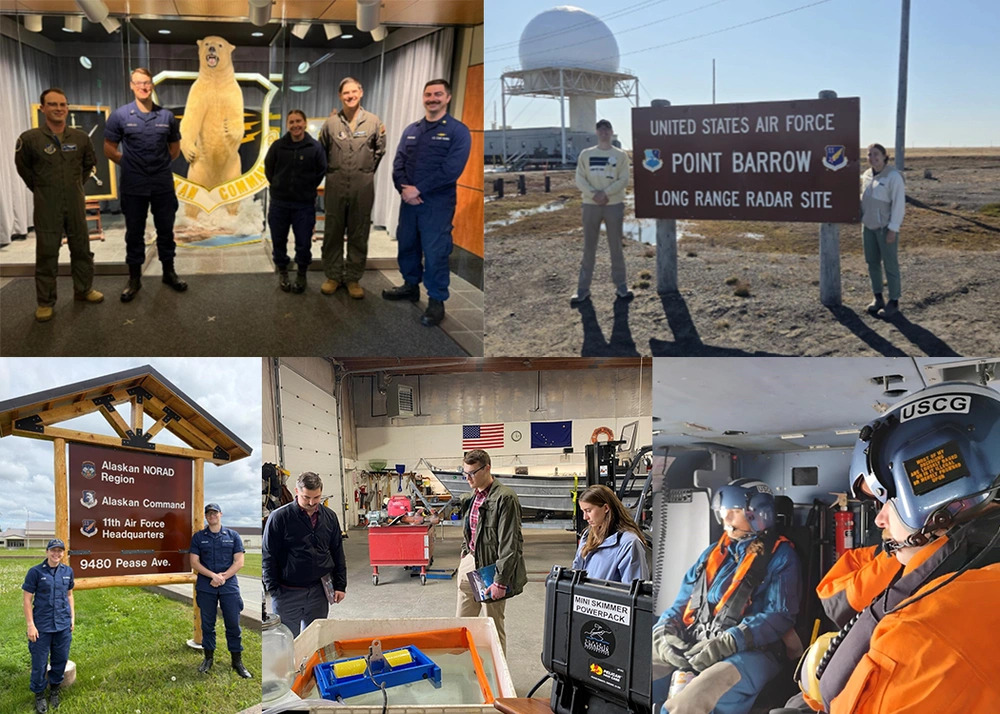
With the Arctic playing an increasingly critical role in U.S. national security, the Ted Stevens Center for Arctic Security Studies is working to prepare tomorrow’s military leaders for the challenges of high-latitude operations.
This summer, U.S. Coast Guard Academy cadets Hazel Mitrik and Justus Moorlach participated in a six-week Arctic Internship hosted by the TSC. The program offered the cadets a unique opportunity to explore the intersection of Arctic operations, interagency planning, and homeland defense.
“This experience helped me understand how the Coast Guard fits into the broader homeland defense strategy,” said Mitrik, a first-class cadet majoring in naval architecture and marine engineering. “It gave me a better picture of where our capabilities can contribute and how interagency efforts can support national security in the Arctic.”
The internship was offered in collaboration with the Coast Guard Academy’s Center for Arctic Study and Policy (CASP), which promotes high-impact learning opportunities that link Arctic education to Coast Guard missions.
Throughout their time in Alaska, the cadets engaged directly with key mission partners, including the U.S. Army’s 11th Airborne Division, U.S. Air Force’s 11th Air Force, the Alaska National Guard, Coast Guard Sector Western Alaska, Marine Safety Unit Valdez, CGC ASPEN, Air Station Kodiak, Base Kodiak, and the Marine Exchange of Alaska. They traveled from Anchorage to Valdez, Seward, Homer, and as far north as Utqiagvik—gaining firsthand perspective on the region’s logistical constraints and strategic importance.
“The briefings with personnel from both the 11th Airborne and 11th Air Force offered valuable perspective on Arctic defense,” said Moorlach, a civil engineering major. “They increased my interest in how the Coast Guard would adapt to a potential interagency collaboration given the current operational environment.”
From remote radar sites and aviation hubs to oil spill response facilities and naval support elements, each engagement highlighted the intersection of infrastructure, environment, and security. The cadets saw how the Arctic’s vast geography, limited access, and harsh conditions shape not only readiness but also resilience.
“I found myself very impressed by the hardy nature of those living on the North Slope, their necessary resilience to the unique environment, and their continued resourcefulness to make life up there sustainable when faced with limited resources and aid,” Moorlach said after visiting Utqiagvik.
Mitrik emphasized that the Arctic’s importance goes beyond geography. “The Arctic has economic, military, and environmental significance,” she said. “It is a location of growing international interest and increasing strategic value. Understanding how we maintain access and awareness in that region is vital.”
In addition to operational site visits and strategic briefings, the cadets collaborated on a capstone research project assessing international icebreaker fleets and their implications for future maritime posture. The project allowed them to connect academic training with real-world defense planning.
“I’m used to designing boats and not necessarily thinking about the implications of design choices for national security,” Mitrik said. “But this internship helped me draw a straight line between fleet readiness, Arctic capabilities, and defense missions.”
Mentorship played a key role in the experience. Through informal discussions with Coast Guard officers and strategy sessions with TSC faculty, the cadets received insights rarely covered in traditional academic settings.
“One of the most valuable aspects of the internship was hearing from people with decades of experience,” Mitrik said. “They helped me think about my future career path in a more strategic way.”
By embedding cadets in the operating environment and connecting them with senior leaders and planners, the TSC Arctic Internship supports Department of Defense efforts to build Arctic-minded leadership and enhance homeland defense readiness.
“This experience helped reinforce my understanding of defense readiness in a region that is often overlooked,” Moorlach said. “It gave me a much clearer picture of the importance of presence, access, and infrastructure in Arctic operations.”
As the Arctic continues to emerge as a strategic theater, the value of preparing future officers for its challenges cannot be overstated.
“I now have a better understanding of the Arctic’s role in securing our homeland,” said Mitrik. “That’s something I’ll take with me into my future assignments.”
